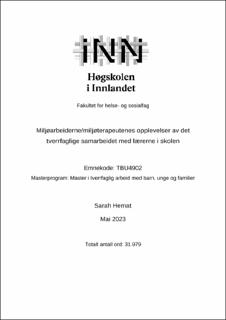Miljøarbeidernes/miljøterapeutenes opplevelser av det tverrfaglige samarbeidet med lærerne i skolen
Master thesis
Permanent lenke
https://hdl.handle.net/11250/3079796Utgivelsesdato
2023Metadata
Vis full innførselSamlinger
Sammendrag
Sammendrag
Bakgrunn og hensikt: Denne masteravhandlingen omhandler skolen som en arena for sosialt arbeid og hvordan miljøarbeidere/miljøterapeuter i skolen opplever det tverrfaglige samarbeidet med lærerne. Selv om skolen som institusjon har et sterkt opplæringsmandat, er opplæringsloven tydelig på at fag ikke er deres eneste oppgave. Skolen er en arena som skal bidra til at barn og unge skal tilegne seg evner til å bli en del av samfunnet og å mestre livet. Sosialarbeiderne kan tilføre lærerne den komplementære kompetansen i dette arbeidet, men rollen deres er ikke lovfestet. Hensikten med studien er å videreutvikle kunnskap om hvordan de to yrkesgruppene samarbeider tverrfaglig, ved å synliggjøre hvilke faktorer som bidrar til at samarbeidet fungerer, samt synliggjøre hvilke faktorer som hemmer utviklingen av gode samarbeid, sett fra miljøarbeidernes/miljøterapeutenes ståsted.
Problemstilling: «Hvordan opplever miljøarbeidere/miljøterapeuter på ungdomsskolen det tverrfaglige samarbeidet med lærerne på arbeidsplassen?»
Metode og utvalg: I denne studien anvendes det en kvalitativ tilnærming med delvis strukturert intervju som forskningsmetode. Det har blitt intervjuet tre barn- og ungdomsarbeidere, to barnevernspedagoger og en spesialpedagog. Alle jobber som sosialarbeidere på ungdomstrinnet med erfaring fra tverrfaglige samarbeid med lærerne på arbeidsplassen. Analysearbeidet i studien ble gjennomført med utgangspunkt i et hermeneutisk-fenomenologisk teoretisk perspektiv.
Funn: funnene synliggjør at det er et tydelig skille mellom de informantene som har høyere utdanning og de som har lavere utdanning. De informantene i studien med høyere utdanning opplever at samarbeidet med lærerne fungerer godt og føler at de blir anerkjent som en profesjon, men peker på utfordringer knyttet til manglende kunnskap om hva de kan bidra med inn i skolen, struktur og formalisering. Informantene uten høyere utdanning, opplever at samarbeidet med lærerne er fraværende og erfarer at deres muligheter til å arbeide med en større del av elevgruppen begrenses på grunn av deres posisjon og avmakt i skolen, at de i stor grad er bundet til enkeltelever og manglende anerkjennelse.
Nøkkelord: miljøterapeuter, lærere, tverrfaglig arbeid, skolen, profesjonskamp, samarbeid Summary
Background and intent: This thesis reflects on concept of the secondary school as an arena for social work and interdisciplinary collaboration between environmental workers/therapists and teachers. Although secondary school is traditionally seen as an educational institution, “Opplæringsloven” (1998) makes it clear that education is not its only purpose. The school is also a realm where children and young people acquire the necessary skills to become active participants in society and navigate their future. Social workers provide teachers with competence to provide their students with these skills, but their role is not acknowledged in law. The purpose of this study is to further develop knowledge regarding how these two professional groups collaborate by highlighting which factors contribute to good collaboration, as well as highlighting which factors inhibit collaboration from the point of view of the environmental workers/therapists.
Thesis: "How do environmental workers/therapists experience collaboration with the teachers at secondary school?"
Method and selection of informants: In this study, a qualitative approach with partially structured interviews has been chosen as the research method. Three child and youth workers, two child welfare pedagogues and one special education teacher has been interviewed. All of the participants are employed at the time of interview as social workers at a secondary school and have collaborated interprofessionally with teachers at their workplace. The analysis work in the study was carried out based on a hermeneutic-phenomenological theoretical perspective.
Findings: The findings of this study highlight that there is a clear distinction between participants who have a higher education and those who have a lower education. This study found that participants with higher education feel that collaboration with teachers works well and feel that their contributions are recognised, meanwhile pointing to challenges related to a general lack of knowledge about the support environmental workers/therapists can provide to students and legal recognition of their contribution within the school’s structure. Participants without higher education experienced that cooperation with teachers is absent and experience that their opportunities to work with a large part of the student group are limited, due to their lack of authority within the school’s hierarchy, that they are largely tied to individual students and lack of recognition for their contributions.
Keywords: enviromental therapists, teachers, school, interprofessionally cooperation, occupational conflict, cooperation
